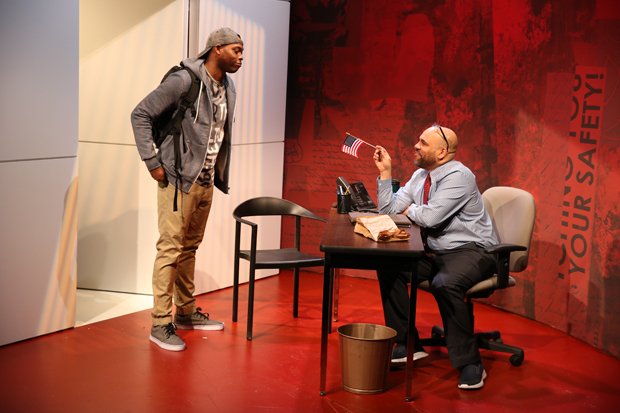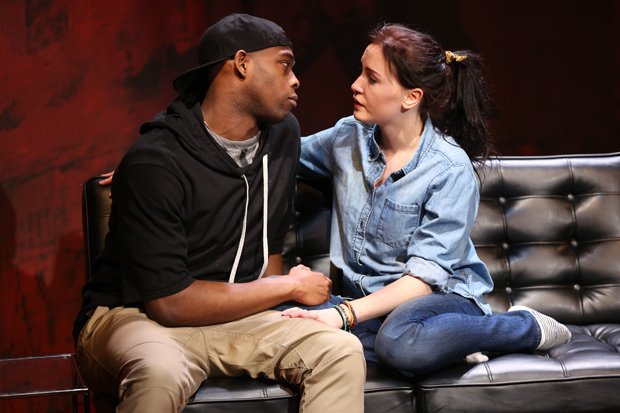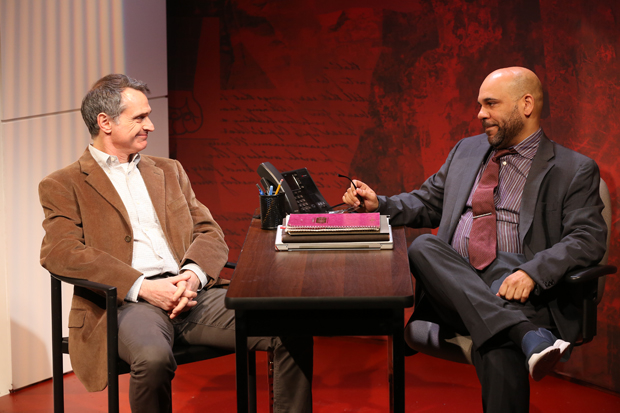Education Ponders Whether Flag-Burning Is an Appropriate School Activity
Brian Dykstra takes on the First Amendment and a whole host of other issues in this new drama.

(© Carol Rosegg)
Perhaps the most valuable lesson any young person can learn is that adults don’t actually have the world that much more figured out than they do. That may be what the students of Brian Dykstra’s Education are learning before our eyes, but it’s hard to tell in this rudderless First Amendment drama from Sanguine Theatre Company.
It begins in the office of high school principal Mr. Kirks (Bruce Faulk), who is questioning Mick (Wesley T. Jones) about an art project in which he suspended the stars and stripes over a Bunsen burner to demonstrate America's hollow commitment to the constitutional rights (like free expression) the flag is supposed to represent. By calling Mick into his office, Mr. Kirks is unwittingly putting the finishing strokes on the piece. When he learns about the artist's intent, Mr. Kirks claims, "The courts have decided that constitutional guarantees are not necessarily afforded students in an educational setting," which is not necessarily true. Mick then responds with a wide-ranging political screed seemingly assembled from scraps found in Aaron Sorkin's wastepaper basket.

(© Carol Rosegg)
The best stage rants are targeted and precise, designed to simultaneously draw the audience in and prick its sensibilities. This barrage of liberal grievances does the exact opposite, repelling us with its lack of focus while coddling our preconceived notions. Mick raves about abortion, mass incarceration, big pharma, and (bizarrely) mayonnaise. "What, nothing on gay marriage?" Kirks caustically retorts, somewhat awkwardly bringing up one of the few issues that can be crossed off the liberal laundry list. By aiming at every target, Mick's rant hits none of them — and this gives us a pretty good indication of the direction of the rest of the play.
We go on to meet Mick's girlfriend, Bekka (Jane West), a young poet who gets in trouble with Kirks over a piece titled "I don't give a f*ck how good you f*ck." We also encounter her conservative Christian mother, Sandy (Elizabeth Meadows Rouse, doing a fine job looking weepy and confused), and Mick's college professor uncle Gordon (an appropriately smug Matthew Boston). As the students plan increasingly transgressive art projects, these stereotypical adults respond exactly as you would expect.
Director Margaret Perry's production does little to enhance a predictable script. Scenic designer David L. Arsenault occupies center stage with a pointless white Rubik's Cube through which the actors enter and exit. Amanda Aiken leans into archetype with her costumes (Sandy's pink bauble necklace is a delightfully ridiculous item). Although Perry's unimaginative staging mostly has the actors gesturing and moving forward on each line, exciting performances do occasionally escape her clutches.
West grabs hold of our flagging attention with a confident and clear interpretation of the aforementioned foulmouthed poem, but not even she can bring lucidity to "I Love You Evolutionary," an incomprehensible pile of mushy platitudes masquerading as a poem. Faulk gives a recognizably human portrayal of Kirks, a tough but fair public school administrator who doesn't actually believe in most of the arbitrary rules he's paid to enforce (surely, this contradiction helps Faulk sell some of his character's more contrived behavior). "I make compromises year by year, month by month, day by day, and sometimes hour by hour," he explains, morosely adding, "Compromises I hate making." Yet he still makes them to avoid the ire of his boss, to maintain his gainful employment, and to keep paying the bills — just like we all do.

(© Carol Rosegg)
Our everyday complicity in oppression is a crucially important story that Dykstra frustratingly swerves away from at every turn, making digressions into religion and domestic violence that play out with all the dramatic tension of a moralizing puppet show. As a result, we learn almost nothing from Education, and feel even less. That shouldn't be the case for a play with such an incendiary premise.








